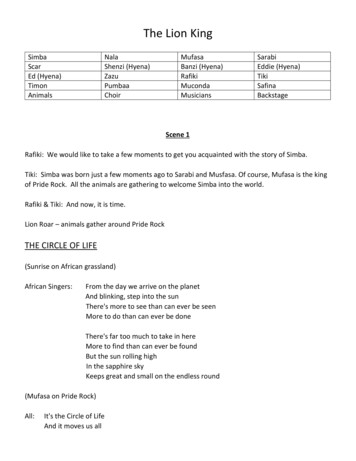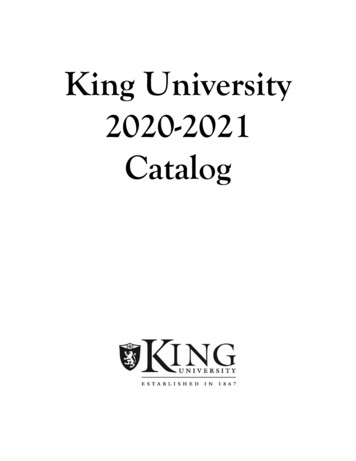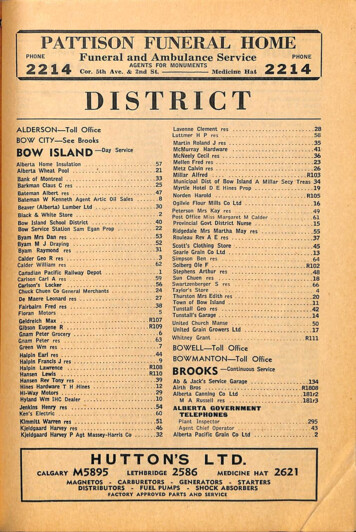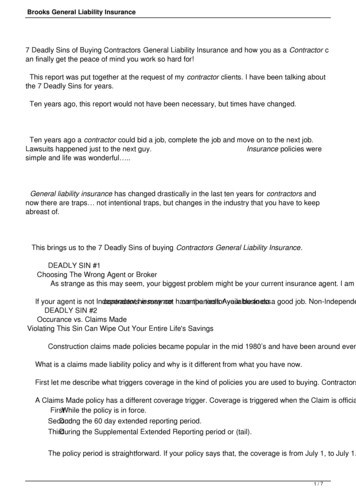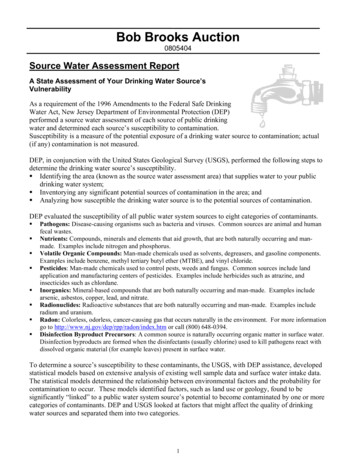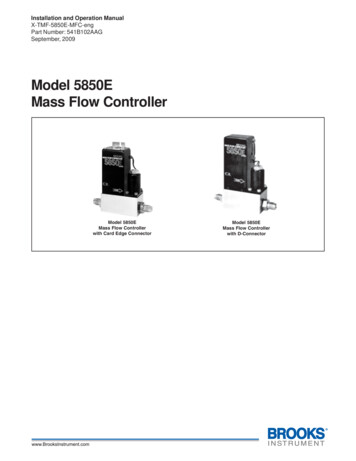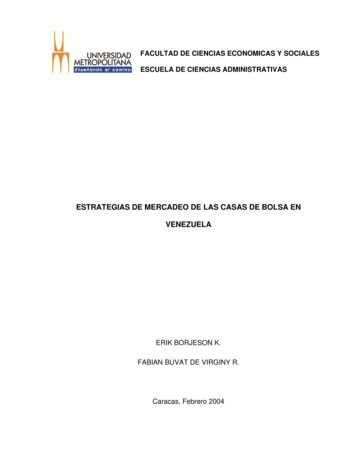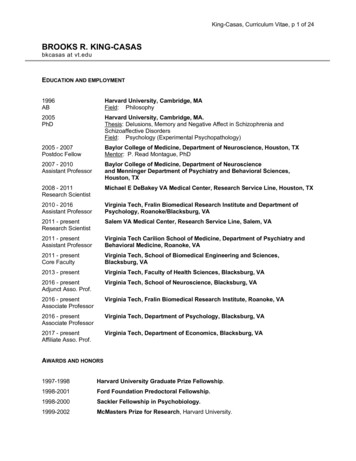
Transcription
King-Casas, Curriculum Vitae, p 1 of 24BROOKS R. KING-CASASbkcasas at vt.eduEDUCATION AND EMPLOYMENT1996ABHarvard University, Cambridge, MAField: Philosophy2005PhDHarvard University, Cambridge, MA.Thesis: Delusions, Memory and Negative Affect in Schizophrenia andSchizoaffective DisordersField: Psychology (Experimental Psychopathology)2005 - 2007Postdoc FellowBaylor College of Medicine, Department of Neuroscience, Houston, TXMentor: P. Read Montague, PhD2007 - 2010Assistant ProfessorBaylor College of Medicine, Department of Neuroscienceand Menninger Department of Psychiatry and Behavioral Sciences,Houston, TX2008 - 2011Research ScientistMichael E DeBakey VA Medical Center, Research Service Line, Houston, TX2010 - 2016Assistant ProfessorVirginia Tech, Fralin Biomedical Research Institute and Department ofPsychology, Roanoke/Blacksburg, VA2011 - presentResearch ScientistSalem VA Medical Center, Research Service Line, Salem, VA2011 - presentAssistant ProfessorVirginia Tech Carilion School of Medicine, Department of Psychiatry andBehavioral Medicine, Roanoke, VA2011 - presentCore FacultyVirginia Tech, School of Biomedical Engineering and Sciences,Blacksburg, VA2013 - presentVirginia Tech, Faculty of Health Sciences, Blacksburg, VA2016 - presentAdjunct Asso. Prof.Virginia Tech, School of Neuroscience, Blacksburg, VA2016 - presentAssociate ProfessorVirginia Tech, Fralin Biomedical Research Institute, Roanoke, VA2016 - presentAssociate ProfessorVirginia Tech, Department of Psychology, Blacksburg, VA2017 - presentAffiliate Asso. Prof.Virginia Tech, Department of Economics, Blacksburg, VAAWARDS AND HONORS1997-1998Harvard University Graduate Prize Fellowship.1998-2001Ford Foundation Predoctoral Fellowship.1998-2000Sackler Fellowship in Psychobiology.1999-2002McMasters Prize for Research, Harvard University.
King-Casas, Curriculum Vitae, p 2 of 241999-2002Stimson Prize for Research, Harvard University.2002-2003Harvard University Graduate Prize Fellowship.2006-2007American Psychological Association Diversity Program in NeurosciencePostdoctoral Fellowship (declined).2006-2007Individual Ruth L. Kirschstein National Research Service.2011Virginia Tech Scholar of the Week, July 92012Kavli Frontier in Science Fellow, National Academy of SciencePROFESSIONAL DEVELOPMENT AND CONTRIBUTIONSMember:Society for Neuroscience; Cognitive Neuroscience Society; Organization for HumanBrain Mapping; Association for Psychological Science.Service:International: Reviewer, Clinical Research Center of Geneva, Switzerland (2012).National: National Institutes of Health CSR Advisory Council Working Group toSimplify Review Criteria (2020-2021); Special Emphasis Scientific Review PanelZMH1 ERB-D (03), review for applications to RFA-MH-16-406 Exploratory ClinicalTrials of Novel Interventions for Mental Disorders (R61/R33), 2015; ZRG1 BBBP-J(03), Stress and Psychopathology, 2017; ZRG1 BBBP-J (02), Emotion, SubstanceUse, and Psychopathology, 2017. Department of Veterans Affairs RehabilitationResearch and Development Service, Department of Veterans Affairs: Scientific MeritReview Panel (2009, 2010, 2011); Rehabilitation Research and DevelopmentService, Department of Veterans Affairs: Career Development Award Panel (2014,2015). Other Program Committee Member, Society for PsychophysiologicalResearch (2000).Baylor College of Medicine: Department of Neuroscience, Faculty SearchCommittee (2006-2008); Department of Neuroscience, Seminar Series (2009-2010);Institutional Diversity Council (2009-2010).Virginia Tech: Research Curriculum Committee, Virginia Tech Carilion School ofMedicine (2011); Advisory Board for the Office of Undergraduate Research (20112012); Translational Biology, Medicine, and Health Program: Admission Committee(2013-present); Translational Biology, Medicine, and Health Program: CurriculumCommittee (2014-present); Department of Economics: Faculty Search Committee(2014-2015); Department of Psychology: Faculty Search Committee (2015-2016,2018); Virginia Tech Carilion Research Institute, Faculty Search Committee, (20172018); Steering Committee for College of Science Faculty Association (2018present); President, College of Science Faculty Association (2019-2020)PUBLICATIONSGoogle Scholar citations 4,495; h-index 22; i10-index 37Deldin, PJ, Deveney, CM, Kim, A, Casas, B, Best, J (2001). A slow wave investigation of working memorybiases in mood disorders. Journal of Abnormal Psychology 110:267-81. doi:10.1037/0021843X.110.2.267
King-Casas, Curriculum Vitae, p 3 of 24King-Casas, B, Tomlin, D, Anen, C, Camerer, CF, Quartz, SR, Montague, PR (2005). Getting to knowyou: Reputation and trust in a two-person economic exchange. Science 308:78-83,doi:10.1126/science.1108062Commentary: Miller, G (2005). Economic game shows how the brain builds trust. Science 308:36,doi:10.1126/science.308.5718.36aDeldin, P, Keller, J, Casas, BR, Best, J, Gergen, J, Miller, G (2006). Normal N400 in mood disorders.Biological Psychology 71:74-79, doi:10.1016/j.biopsycho.2005.02.005Montague, PR, King-Casas, B, Cohen, JD (2006). Imaging valuation models in human choice. AnnualReview of Neuroscience 29:417-448, doi:10.1146/annurev.neuro.29.051605.112903Tomlin, D, Kayali, MA, King-Casas, B, Anen, C, Camerer, CF, Quartz, SR, Montague, PR (2006). Agentspecific responses in cingulate cortex during economic exchanges. Science 312:1047-1050,doi:10.1126/science.1125596Li, J, McClure, SM, King-Casas, B, Montague, PR (2006). Policy adjustment in dynamic economic game.PLoS ONE 1(1):e103, doi:10.1371/journal.pone.0000103Montague, PR, King-Casas, B (2007). Efficient statistics, common currencies and the problem of rewardharvesting. Trends in Cognitive Sciences 11:514-519. doi:10.1016/j.tics.2007.10.002Casement, MD, Shestyuk, AY, Best, JL, Casas, B, Glezer, A, Segundo, MA, Deldin, PJ (2008).Anticipation of affect in dysthymia: Behavioral and neurophysiological indicators. BiologicalPsychology 77:197-204. doi:10.1016/j.biopsycho.2007.10.007King-Casas, B, Sharp, C, Lomax-Bream, L, Lohrenz, T, Fonagy, P, Montague, PR (2008). The ruptureand repair of cooperation in borderline personality disorder. Science 321:806-810.doi:10.1126/science.1156902Commentary: Meyer-Lindenberg, A (2008) Trust me on this. Science 321:778-780.doi:10.1126/science.1162908Rilling, JK, King-Casas, B, Sanfey, A (2008). The neurobiology of social decision-making. CurrentOpinion in Neurobiology 18:159-165. doi:10.1016/j.conb.2008.06.003Ray, D, King-Casas, B, Montague, PR, Dayan, P (2008). Bayesian model of behavior in economicgames. Advances in Neural Information Processing Systems 21.Deldin, PJ, Naidu, SK, Shestyuk, AY, Casas, BR (2009). Neurophysiological indices of free recall memorybiases in major depression: The impact of stimulus arousal and valence. Cognition & Emotion23:1002-20. doi:10.1080/02699930802273573Lindsey, L, King-Casas, B, Brovko, J, Chiu, PH (2009). Toward functional neurobehavioral assessment ofmood and anxiety. Conf Proc IEEE Eng Med Biol Soc.Klumpp, H, Keller, J, Miller, GA, Casas, BR, Best, JL, Deldin, PJ (2010). Semantic processing ofemotional words in depression and schizophrenia. International Journal of Psychophysiology75:211-215. doi:10.1016/j.ijpsycho.2009.12.004Kishida, K, King-Casas, B, Montague, PR (2010). Neuroeconomic approaches to mental disorders.Neuron 67:543-54. doi:10.1016/j.neuron.2010.07.021Tso IF, Chiu, P, King-Casas, BR, Deldin, PJ. (2011). Alterations in affective processing of attack imagesfollowing September 11, 2001. Journal of Traumatic Stress 24:538-545. doi:10.1002/jts.20678D’Andrea W, Chiu, P, Casas, B, Deldin, P. (2012). Linguistic predictors of PTSD symptoms followingSeptember 11, 2001. Applied Cognitive Psychology 26:316-323. doi:10.1002/acp.1830King-Casas, B & Chiu, PH (2012). Understanding social function in psychiatric illness through multi-playereconomic games. Biological Psychiatry 72:119-25. , N, Christopoulos, GI, King-Casas, B (2012). Neural computations underlying socialrisk sensitivity. Front Hum Neurosci 6:213. doi:10.3389/fnhum.2012.00213
King-Casas, Curriculum Vitae, p 4 of 24Eierud, C, Craddock, C, Fletcher, S, Aulakh M, King-Casas, B, Kuehl, D, LaConte, SM (2014).Neuroimaging after mild traumatic brain injury: Review and meta-analysis. NeuroImage: Clinical4:283-294. doi:10.1016/j.nicl.2013.12.009Lee, MR, Glassman, M, King-Casas, B, Kelly, DL, Stein, EA, Schroeder, J, Salmeron, BJ (2014).Complexity of oxytocin ׳ s effects in a chronic cocaine dependent population. EuropeanNeuropsychopharmacology 24:1483-91. doi:10.1016/j.euroneuro.2014.06.005Williams, W, Graham, D, McCurry, K, Sanders, A, Eiseman, J, Chiu, PH, King-Casas, B (2014). Grouppsychotherapy’s impact on trust in veterans with PTSD: A pilot study. Bulletin of the MenningerClinic 78, 335 - 348. doi:10.1521/bumc.2014.78.4.335Zhu, L, Jenkens, AC, Set, E, Scabini, D, Knight, RT, Chiu, PH, King-Casas, B, Hsu, M (2014). Damage todorsolateral prefrontal cortex affects tradeoffs between honesty and self-interest. NatureNeuroscience 17:1319-21. doi:10.1038/nn.3798Christopoulos, GI, King-Casas, B (2015). With you or against you: social orientation dependent learningsignals guide actions made for others. NeuroImage ng, D, Christopoulos, G, King-Casas, B, Ball, SB, Chiu, PH (2015) Social signals of safety and riskconfer utility and have asymmetric effects on observers’ choices. Nature Neuroscience 18:912-6.doI://10.1038/nn.4022Commentary in: Smith, DV & Delgado, MR (2015) Social nudges: utility conferred from others.Nature Neuroscience 18, 791 – 792. doi:10.1038/nn.4031Idelson, CR, Vogt, WC, King-Casas, B, LaConte, SM, Rylander, CG (2015) Effect of mechanical opticalclearing on near-infrared spectroscopy. Lasers in Surgery & Medicine doi:10.1002/lsm.22373Aimone, J, Ball, S, King-Casas, B (2015). The betrayal aversion elicitation task: An individual level ofbetrayal aversion measure. PLoS ONE 10(9):e0137491. doi:10.1371/journal.pone.0137491Kim-Spoon, J, Kahn, R, Deater-Deckard, K, Chiu, PH, Steinberg, L, King-Casas, B (2016). Risky decisionmaking in a laboratory driving task is associated with health risk behaviors during late adolescencebut not adulthood. International Journal of Behavioral Development 40(1):58-63.doi://10.1177/0165025415577825Aimone JA, Ball S, King-Casas B (2016). It’s not what you see but how you see it: Using eye-tracking tostudy the risky decision-making process. Journal of Neuroscience, Psychology, and Economics9(3-4):137-144. doi://10.1037/npe0000061Kim-Spoon J, Deater-Deckard K, Holmes C, Lee J, Chiu P, King-Casas B (2016). Behavioral and neuralinhibitory control moderates the effects of reward sensitivity on adolescent substance use.Neuropsychologia 91:318-326. doi://10.1016/j.neuropsychologia.2016.08.028Aimone JA, Ball S, King-Casas B (2016). 'Nudging' risky decision-making: The causal influence ofinformation order. Economic Letters 149(C):161-163. doi://10.1016/j.econlet.2016.10.030Kahn RE, Deater-Deckard K, King-Casas B, Kim-Spoon J (2016). Intergenerational similarity in callousunemotional traits: Contributions of hostile parenting and household chaos during adolescence.Psychiatry Research 246:815-820. doi://10.1016/j.psychres.2016.10.023Chung D, Kadlec K, Aimone JA, McCurry K, King-Casas B, Chiu PH (2017). Valuation in majordepression is intact and stable in a non-learning environment. Scientific Reports 7:44374.doi://10.1038/srep44374Kim-Spoon J, Kahn RE, Lauharatanahirun N, Deater-Deckard K, Bickel WK, Chiu PH, King-Casas B(2017). Executive functioning and substance use in adolescence: Neurobiological and behavioralperspectives. Neuropsychologia 100:79-92. t A, Holmes CJ, Deater-Deckard K, King-Casas B, Kim-Spoon J (2017). Household chaos as acontext for intergenerational transmission of executive functioning. Journal of Adolescence 58:4048. doi://10.1016/j.adolescence.2017.05.001
King-Casas, Curriculum Vitae, p 5 of 24Kim-Spoon J, Maciejewski D, Lee J, Deater-Deckard K, King-Casas, B (2017). Longitudinal associationsamong family environment, neural cognitive control, and social competence among adolescents.Developmental Cognitive Neuroscience 26:69-76. doi://10.1016/j.dcn.2017.04.009Kim-Spoon J, Deater-Deckard K, Lauharatanahirun N, Farley JP, Chiu PH, Bickel WK, King-Casas B(2017). Neural interaction between risk sensitivity and cognitive control predicting health riskbehaviors among late adolescents. Journal of Research on Adolescence 27:674-682.doi://10.1111/jora.12295Brown VM, Zhu L, Wang JM, Frueh BC, King-Casas B, Chiu P (2018). Associability-modulated losslearning is increased in posttraumatic stress disorder. eLife 7:e30150. doi://10.7554/eLife.30150Lauharatanahirun N, Maciejewski D, Holmes C, Deater-Deckard K, Kim-Spoon J, King-Casas B (2018).Neural correlates of risk processing among adolescents: Influences of parental monitoring andhousehold chaos. Child Dev 89(3):784-796. doi://10.1111/cdev.13036Brieant A, Holmes CJ, Maciejewski D, Lee J, Deater-Deckard K, King-Casas B, Kim-Spoon J (2018).Positive and negative affect and adolescent adjustment: Moderation effects of prefrontalfunctioning. J Res Adolesc 28:40-55. doi://10.1111/jora.12339Maciejewski D, Lauharatanahirun N, Herd T, Lee J, Deater-Deckard K, King-Casas B, Kim-Spoon J(2018). Neural cognitive control moderates the association between insular risk processing andrisk-taking behaviors via perceived stress in adolesents. Dev Cogn Neurosci 30:150-158.doi://10.1016/j.dcn.2018.02.005Brieant A, Holmes CJ, Maciejewski D, Lee J, Deater-Deckard K, King-Casas B, Kim-Spoon J (2018).Positive and negative affect and adolescent adjustment: Moderation effects on prefrontalfunctioning. Journal of Research on Adolescence 28:40-55. doi://0.1111/jora.12339Herd T, Li M, Maciejewski D, Lee J, Deater-Deckard K, King-Casas B, Kim-Spoon J (2018). Inhibitorycontrol mediates the association between perceived stress and secure relationship quality.Frontiers in Psychology 9:217. doi://10.3389/fpsyg.2018.00217Maciejewski D, Brieant A, Lee J, King-Casas B, Kim-Spoon J. (2018). Neural cognitive control moderatesthe relation between negative life events and depressive symptoms in adolescents. J Clin ChildAdolesc Psychol 7:1-16. doi://10.1080/15374416.2018.1491005Kahn RE, Chiu PH, Deater-Deckard K, Hochgraf AK, King-Casas B, Kim-Spoon J. (2018). The interactionbetween punishment sensitivity and effortful control for emerging adults' substance use behaviors.Subst Use Misuse 53:1299-1310. doi://10.1080/10826084.2017.1407790Kim-Spoon J, Deater-Deckard K, Calkins SD, King-Casas B, Bell MA. (2019). Commonality betweenexecutive functioning and effortful control related to adjustment. J Appl Dev Psychol 60:47-55.doi://10.1016/j.appdev.2018.10.004Wang JM, Zhu L, Brown VM, De La Garza R, Newton T, King-Casas B, Chiu PH (2019). In cocainedependence, neural prediction errors during loss avoidance are increased with cocaine deprivationand predict drug use. Biol Psychiatry Cogn Neurosci Neuroimaging 4:291-299.doi://10.1016/j.bpsc.2018.07.009Peviani KM, Kahn RE, Maciejewski D, Bickel WK, Deater-Deckard K, King-Casas B, Kim-Spoon J.(2019). Intergenerational transmission of delay discounting: The mediating role of household chaos.J Adolesc. 72:83-90. doi://10.1016/j.adolescence.2019.03.002Kim-Spoon J, Lauharatanahirun N, Peviani K, Brieant A, Deater-Deckard K, Bickel WK, King-Casas B.(2019). Longitudinal pathways linking family risk, neural risk processing, delay discounting, andadolescent substance use. J Child Psychol Psychiatry 60:655-664. doi://10.1111/jcpp.13015Holmes C, Brieant A, King-Casas B, Kim-Spoon J. (2019). How Is religiousness associated withadolescent risk-taking? The roles of emotion regulation and executive function. J Res Adolesc29:334-344. doi://10.1111/jora.12438
King-Casas, Curriculum Vitae, p 6 of 24Kim-Spoon J, Deater-Deckard K, Brieant A, Lauharatanahirun N, Lee J, King-Casas B. (2019). Brains ofa feather flocking together? Peer and individual neurobehavioral risks for substance use acrossadolescence. Dev Psychopathol 31:1661-1674. doi://10.1017/S0954579419001056Peviani KM, Brieant A, Holmes CJ, King-Casas B, Kim-Spoon J. (2019). Religious social support protectsagainst social risks for adolescent substance use. J Res Adolesc doi://10.1111/jora.12529Deater-Deckard K, Li M, Lee J, King-Casas B, Kim-Spoon J. (2019). Poverty and puberty: Aneurocognitive study of inhibitory control in the transition to adolescence. Psychol Sci 30:15731583. doi://10.1177/0956797619863780Li M, Lauharatanahirun N, Steinberg L, King-Casas B, Kim-Spoon J, Deater-Deckard K. (2019).Longitudinal link between trait motivation and risk-taking behaviors via neural risk processing. DevCogn Neurosci 40:100725. doi://10.1016/j.dcn.2019.100725Elder J, Brieant A, Lauharatanahirun N, King-Casas B, Kim-Spoon J. (2019). Insular risk processingpredicts alcohol use via externalizing pathway in male adolescents. J Stud Alcohol Drugs 80:602613. doi://10.15288/jsad.2019.80.602Williams MW, Graham D, Sciarrino NA, Esty M, McCurry K, Chiu P, King-Casas B. (2020). Does validitymeasure response affect group CPT outcomes in veterans with PTSD? Military Medicine185:e370-e376. doi://10.1093/milmed/usz385McCurry KL, Frueh BC, Chiu PH, King-Casas B. (2020). Opponent effects of hyperarousal and reexperiencing on affective habituation in posttraumatic stress disorder. Biol Psychiatry CognNeurosci Neuroimaging 5(2):203-212. doi://10.1016/j.bpsc.2019.09.006Herd T, King-Casas B, Kim-Spoon J. (2020). Developmental changes in emotion regulation duringadolescence: Associations with socioeconomic risk and family emotional context. J Youth Adolesc49:1545-1557. doi://10.1007/s10964-020-01193-2Asscheman JS, Deater-Deckard K, Lauharatanahirun N, van Lier PAC, Koot S, King-Casas B, KimSpoon J. (2020). Associations between peer attachment and neural correlates of risk processingacross adolescence. Dev Cogn Neurosci 42:100772. doi://10.1016/j.dcn.2020.100772Kim-Spoon J, Herd T, Brieant A, Peviani KM, Lauharatanahirun N, Lee J, Deater-Deckard K, Bickel WK,King-Casas B. (2020). Bidirectional links between adolescent brain function and substance usemoderated by cognitive control. J Child Psychol Psychiatry doi://10.1111/jcpp.13285Brieant A, Peviani KM, Lee JE, King-Casas B, Kim-Spoon J. (2020). Socioeconomic Risk for AdolescentCognitive Control and Emerging Risk-Taking Behaviors. J Res Adolesc 31:71-84.doi://10.1111/jora.12583Brieant A, King-Casas B, Kim-Spoon J. (2020). Transactional relations between developmentaltrajectories of executive functioning and internalizing and externalizing symptomatology inadolescence. Dev Psychopathol doi://10.1017/S0954579420001054Chung D, Orloff MA, Lauharatanahirun N, Chiu PH, King-Casas B. (2020). Valuation of peers' safechoices is associated with substance-naïveté in adolescents. Proc Natl Acad Sci U S A117(50):31729-31737. doi://10.1073/pnas.1919111117Brieant A, Herd T, Deater-Deckard K, Lee J, King-Casas B, Kim-Spoon J. (2021). Processes linkingsocioeconomic disadvantage and neural correlates of cognitive control in adolescence. Dev CognNeurosci 48:100935. doi://10.1016/j.dcn.2021.100935Kim-Spoon J, Herd T, Brieant A, Peviani K, Deater-Deckard K, Lauharatanahirun N, Lee J, King-Casas B.(2021). Maltreatment and brain development: The effects of abuse and neglect on longitudinaltrajectories of neural activation during risk processing and cognitive control. Dev Cogn Neurosci48:100939. doi://10.1016/j.dcn.2021.100939Michael J, Chennells M, Nolte T, Ooi J, Griem J; London Personality and Mood Disorder ResearchNetwork, Christensen W, Feigenbaum J, King-Casas B, Fonagy P, Montague PR. (2021). Probing
King-Casas, Curriculum Vitae, p 7 of 24commitment in individuals with borderline personality disorder. J Psychiatr Res Li Flora, Chiu PH, King-Casas B. (in press). Trust vs. Reciprocity: The role of outcome-based and beliefbased motivations. In F Krueger (Ed). The Neurobiology of Trust. Cambridge: Cambridge UniversityPress.RESEARCH SUPPORTOngoing Research SupportR01 DA051573King-Casas/Chiu (MPI)04/01/21 – 03/31/26NIH/NIDA 3,476,235 Total AwardSocial influence on choices in adolescent substance useThis project will whether substance use, and changes in substance use, are related to individualdifferences in two neurocomputational mechanisms by which social information influences risky decisionmaking.Role: PIR01 MH122948King-Casas/Montague (MPI) 04/08/20 - 02/28/25NIH/NIMH 3,339,297 Total AwardDirect sub-second measurement of neuromodulator signaling during risky decision-makingThis award will combine electrochemistry and machine learning methods to directly measure serotonin,norepinephrine and dopamine in humans on a sub-second basis to investigate the neurocomputationalrole of these neurotransmitters in risky choice.Role: PIR01 DA036017King-Casas/Kim-Spoon (MPI) 09/15/18 - 06/30/23NIH/NIDA 3,726,822 Total AwardNeurobehavioral determinants of health risk behaviors: From adolescence to young adulthoodThis project uses a neuroeconomic approach to study developmental trajectories of risky decision-makingin a longitudinal sample transitioning from adolescence into young adulthood.Role: PIR01 MH115221King-Casas (PI)02/01/18 - 12/31/22NIH/NIMH 3,191,845 Total AwardNeurobehavioral mechanisms of social dysfunction in Borderline Personality DisorderThis project will use computational models of social behavior and functional magnetic resonance imagingto evaluate interpersonal dysfunction in Borderline Personality Disorder.Role: PIMerit D2354RKing-Casas (PI)07/01/18 - 06/30/23VA/RR&D 1,099,656 Total AwardEfficacy and neural mediators of response to TMT for PTSDThe study will investigate neural mechanisms of treatment using functional magnetic resonance imagingand probes of affective and social behavior.Role: PIR01 MH106756NIH/NIMHChiu (PI)02/01/16 - 12/31/21
King-Casas, Curriculum Vitae, p 8 of 24 3,577,746 Total AwardNeural substrates of reinforcement learning and its training in depressionThis project will use neurocomputational methods to study and improve learning in depression.Role: Co-IOngoing Training/Mentoring SupportUL1TR003015DiFeliceantonio (PI)07/01/20 – 06/30/22NIH-CTSA (Univ. of VA flow-thru) 341,726 Total AwardNeural and metabolic correlates of carbohydrate rewardThe goal of this project is to evaluate the role of metabolic kinetics in food reinforcement and test thehypothesis that, similar to drugs of abuse, the speed at which post-ingestive signals get to the braininfluences food preference.Role: MentorR25 GM066534Smith (PI)08/04/03 - 06/30/23NIH/NIGMS 2,047,685 Total AwardThe Virginia Tech Postbaccalaureate Research and Education ProgramThe research and education program seeks to recruit and prepare postbaccalaureate scholars foradmission into competitive and highly selective biomedical and behavioral sciences doctoral programs atresearch-intensive universities.Role: Program FacultyR25 NS105141Fox (PI)01/01/18 - 12/31/22NIH/NINDS 420,809 Total AwardVirginia Tech Carilion Research Institute Translational Neurobiology Summer Undergraduate ResearchFellowshipThis program seeks to provide research experiences to undergraduate and high school students intranslational neurobiology research and to expose students to independent research early in theircareers.Role: Program FacultyR25 GM072767Smith (PI)01/11/07 - 04/30/22NIH/NIGMS 2,352,565 Total AwardVirginia Tech – Initiative for Maximizing Student Development (VT-IMSD)This training program seeks to develop and train underrepresented minorities in acquiring skills needed tosucceed in Ph.D. programs and biomedical and behavioral research.Role: Program FacultyR01 MH115221-02S1King-Casas (PI)02/01/18 - 12/31/21NIH/NIMH 168,174 Total AwardNeurobehavioral mechanisms of social dysfunction in borderline personality disorderThis diversity supplement supports the training and development of a postbaccalaureate trainee.Role: PICompleted SupportDP7 OD018428Friedlander/Van Wart (MPI) 09/20/13 - 08/31/20NIH/ODMentorship and Development Program for Biomedical Trainees (BEST)This mentorship and development program will provide early development and guidance for biomedical
King-Casas, Curriculum Vitae, p 9 of 24trainees.Role: Program FacultyR01 HD074574Ramey/DeLuca (MPI)03/01/14 - 02/29/20NIH/NICHDMultisite RCT of 3 neurorehabilitation therapies for infants with asymmetrical CPThis award will evaluate the effectiveness of constraint-induced movement therapy for infants withcerebral palsy, and use functional near infrared spectroscopy to evaluate therapy-related changes incortical activity.Role: Co-IN/AKatz (PI)12/15/17 - 06/30/18Adaptive Brain & Behavior Request for Concepts 2017, Virginia TechtDCS modulation of risky decision makingSeed money support for work focused on modulation of neural mechanisms of risky choice.Role: Co-IN/AChiu (PI)12/15/17 - 06/30/18Adaptive Brain & Behavior Request for Concepts 2017, Virginia TechToward mental health through decision neuroscienceSeed money support for work focused on developing behavioral interventions to modify reinforcementlearning abnormalities associated with depression and anxiety.Role: Co-IN/AKing-Casas (PI)11/15/17 - 06/30/18Data & Decisions Request for Concepts 2017, Virginia TechSocial influence on risky decision-making in adolescentsSeed money support for work focused on neural mechanisms of social influence in adolescents.Role: PIN/AMontague (PI)05/01/11 - 04/30/18Wellcome TrustComputational neuroscience of social behavior and psychopathologyThis award will support the development of computational models of decision-making to examinedeveloping psychopathologies.Role: CollaboratorF31 DA042594Lauharatanahirun (PI)08/15/16 - 09/14/17NIH/NIDANeurobehavioral mechanisms of substance use and protective behaviors in adolescentsThis training fellowship will provide training in the use of economic models of choice and neuroimaging toinvestigate adolescent decision-making related to substance use.Role: SponsorN/AKing-Casas/Kim-Spoon (MPI) 12/15/16 - 05/31/17Institute for Society, Culture and Environment Scholars Program, Virginia TechNeurobehavioral determinants of adolescent substance use and HIV/STDSeed money support of resting-state and task-based connectivity analyses of adolescence data.Role: PIR01 MH087692Chiu (PI)07/01/10 - 03/31/16NIH/NIMHNeurobehavioral metrics for the assessment and treatment of depressionThis study will identify quantitative neural predictors of domain-specific response to CBT in depression.Role: Co-I
King-Casas, Curriculum Vitae, p 10 of 24R01 MH091872Chiu (PI)06/03/10 - 03/31/16NIH/NIMHNeuroimaging major depression and nicotine dependence on axes of valuationThe study will identify and refine a common neurobehavioral space within which anomalies of valuation indepression and nicotine dependence may be understood.Role: Co-IR01 MH085496Montague (PI)06/15/10 - 03/21/16NIH/NIMHNeural economics of biological substrates of valuationThis study will use functional magnetic resonance imaging, staged social interactions, and computationaltheory to probe the way that humans carry out reciprocal social exchange.Role: Co-IMOE2012-T2-1-051Hong (PI)01/01/13 - 12/31/15Ministry of Education, Singapore / Academic Research FundDiscovering the cognitive and neurological basis of cultural competenceThis award examines the acquisition of cultural information in learning and decision-making.Role: CollaboratorCDA-2 B7496WGraham (PI)01/01/11 – 12/31/14VA/RR&DIdentifying biologic markers for TBI recovery with fMRI and behavioral testsThis award will support mid-career development through a research project investigating recovery-relatedchanges in neural activity and behavioral performance in OEF/OIF veterans with mTBI.Role: MentorMerit D7030RKing-Casas (PI)10/01/09 – 09/30/13VA/RR&DNeurobehavioral assessment of interpersonal functioning in PTSDThe study will investigate neural correlates of interpersonal difficulties in OEF/OIF veterans with PTSD.Role: PIR21/R33 DA026086Chiu/LaConte (PIs)09/15/08 - 06/30/13NIH/NIDALocalized and distributed real-time fMRI approaches to facilitate self-control in substance abusersThis study will investigate the utility of real-time neurofeedback as a novel therapeutic approach for thetreatment of nicotine abuse.Role: Co-IB7760PWilliams (PI)04/01/11 – 03/31/13VA/RR&DNeuroimaging the impact of treatment on neural substrates of trust in PTSDThe study will investigate treatment-related changes in neural correlates of interpersonal functioning inOEF/OIF veterans with PTSD.Role: Co-IRehabilitation Research Center of ExcellenceArlinghaus/Levin (PIs)07/01/09 – 09/30/11VA/ORDNeurorehabilitation: Neurons to Networks Center of ExcellenceThe Center of Excellence will support research on blast-related mild TBI, including neuroimagingresearch underlying decision-making abnormalities.Role: Project PIF32 MH07845NIH/NIMHKing-Casas (PI)07/01/06 - 06/30/07
King-Casas, Curriculum Vitae, p 11 of 24Learning signals within an iterated social exchangeRole: PITEACHING AND ADVISINGUndergraduate student training1999 - 2003Research Supervisor, Department of Psychology, Harvard University. Supervisedundergraduate research assistants and students conducting honors thesis research.1999 - 2002Teaching Fellow, Laboratory in Psychophysiology, (Psy 1856r), Harvard University.Teaching Fellow, Psychophysiology, (Psy 1802), Harvard University.Teaching Fellow, Mood Disorders, (Psy 1855), Harvard University.2007 - 2010Research Supervisor, Department of Neuroscience, Baylor College of Medicine.Supervised undergraduate project interns assisting in all aspects of research in thelaboratory. (1) Magdalena Wistuba, 2007 - 2010, Rice University; (2) Sam Soundar,2008 - 2009, Rice University; (3) Christina Brovko, Summer 2008, UC Riverside; (4)Andrew Thompson, 2008 - 2009, Rice Unive
King-Casas, Curriculum Vitae, p 2 of 24 1999-2002 Stimson Prize for Research, Harvard University. 2002-2003 Harvard University Graduate Prize Fellowship. 2006-2007 American Psychological Association Diversity Program in Neuroscience Postdoctoral Fellowship (declined). 2006-2007 Individual Ruth L. Kirschstein National Research Service. 2011 Virginia Tech Scholar of the Week, July 9

